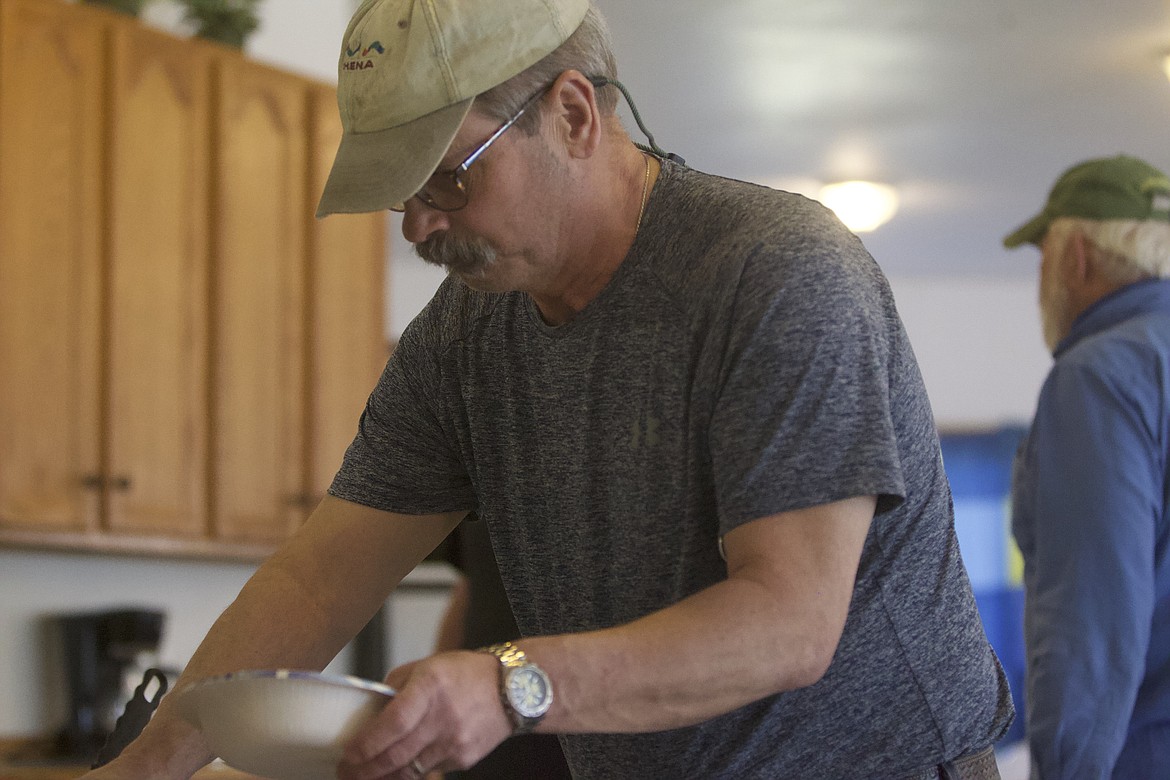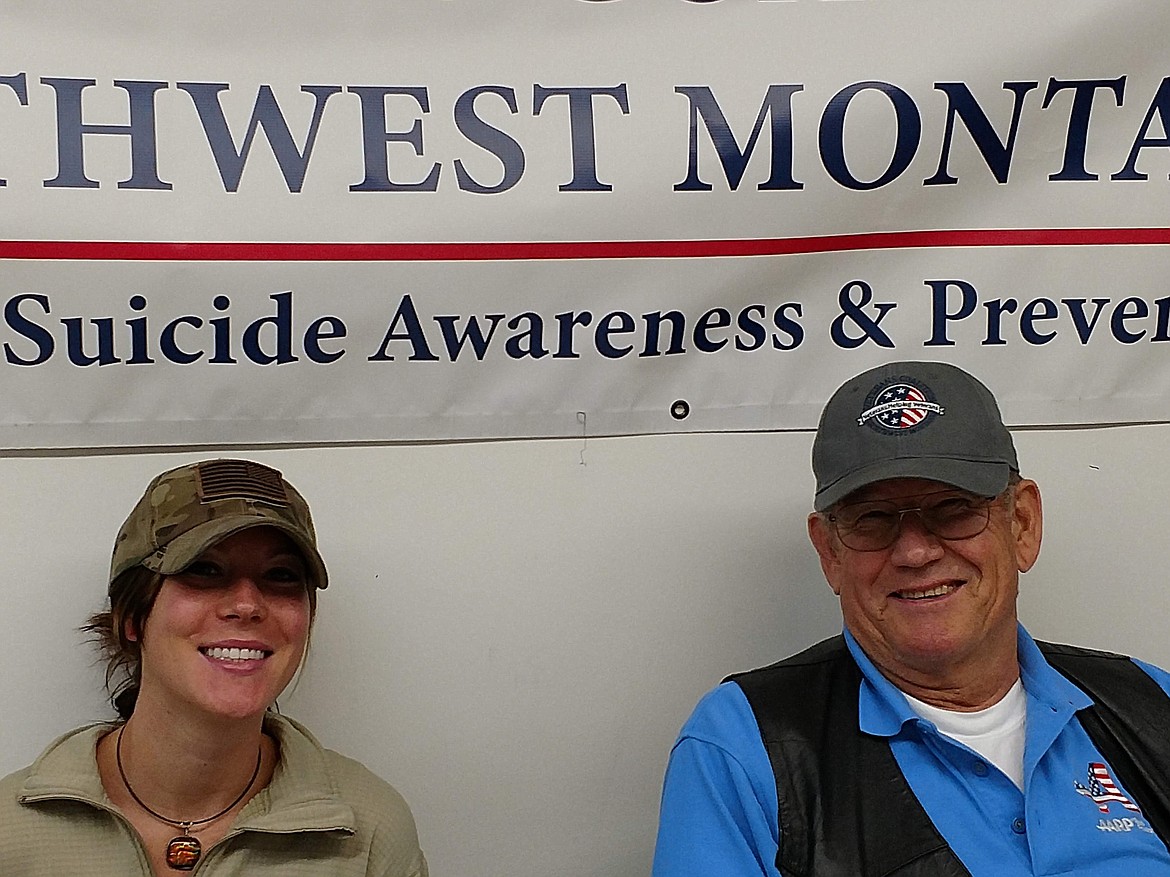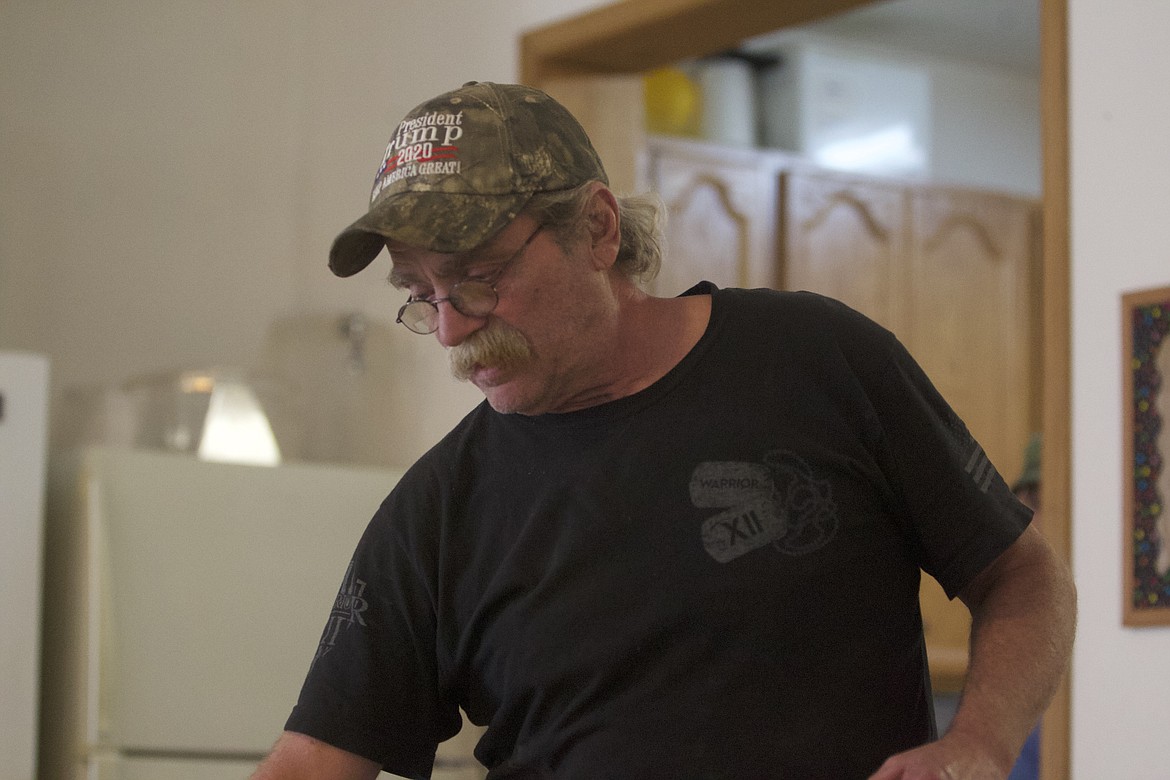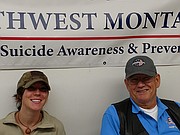Veterans serve on the front lines of suicide prevention
WILL LANGHORNE | Hagadone News Network | UPDATED 4 years, 7 months AGO
Rick Morrow knew time was limited when he got the call.
A distraught woman had told his pastor that her husband, an Army veteran, was suffering a severe mental health crisis. While the pastor wasn’t sure if he could help, he said he knew someone who could.
With six deployments in Iraq and Afghanistan under his belt, Morrow had seen the long-term effects of warzone trauma play out firsthand. He knew that fellow soldiers, haunted by chronic pain and stress, were especially prone to take their own lives.
After speaking with his pastor, Morrow found the young veteran sitting in a dark closet with a .45 caliber pistol in his hand.
“I violated the rules, I shouldn’t have gone,” said Morrow. “But he’s alive today.”
The veteran, who lived in the woods of southern Lincoln County, had suffered serious and defiguring injuries while in the service. Unwilling to go out in public, the man only ventured outside in the dark to sit on his porch.
“Another week, 10 days, he’d have killed himself,” said Morrow.
In hopes of helping more former service members, Morrow began coordinating with the Veterans Coalition of Northwest Montana, a group based out of Kalispell that is dedicated to preventing veteran suicide. Morrow worked alongside Jim Higgins, a veteran and member of the coalition’s board of directors, who started expanding the organization into Lincoln County after joining the group roughly three years ago.
Higgins said he was drawn to the coalition after reading that the list of suicides among Vietnam veterans had outgrown the number of names on the wall of the war’s memorial in Washington, D.C. With younger generations embroiled in a continuous series of conflicts dating back to the Gulf War, Higgins foresaw a worsening problem.
“What we need to do is get the country ready for what I think will be an onslaught of suicide,” said Higgins.
The rate of suicide among veterans is trending upward, according to the latest numbers issued from the U.S. Department of Veteran Affairs. The November report, which lagged behind two years, found that 32 veterans committed suicide that year for every 100,000 veterans across the nation in 2018. The figure is up from 2017 when the suicide rate was 31.
The numbers for Montana were even more troubling. The report showed that for every 100,000 veterans in the state, 60.9 committed suicide in 2018.
Higgins said that many factors combine to make veterans in Montana particularly vulnerable to suicide. The state’s low population density can lead to social isolation and make it difficult to find quality mental health care. Firearms, a preferred means of committing suicide among veterans, are easily accessible. Elevations above 2,000 feet, which the VA has stated is correlated with an increased risk for suicide, are prevalent throughout the state.
Often veterans aren’t the only ones affected by the trauma of their service. High rates of divorce, suicide and abuse seen among former service members can strain those around them.
“When you talk about a veteran, you are really talking about a veteran family as well,” said Higgins.
While Higgins and Morrow are not medically trained to prevent suicides, they believe that they — and anyone else — can help save lives by identifying and addressing the telltale signs of suicidal depression. The system they use, known as Question, Persuade and Refer (QPR), can help any individual at risk of suicide and is backed by the Montana Department of Public Health and Human Services.
The first step in the QPR system involves spotting clues of suicidal intent. These range from obvious signs, like someone declaring that they plan to kill themselves, to more subtle behavioral changes, such as a person giving away prized possessions and stockpiling guns or pills.
QPR then urges anyone close to a person at risk of suicide to ask them if they plan to take their own life.
“How you ask the question is less important than that you ask it,” reads a PowerPoint slide from the QPR Institute.
Followers of QPR then work to persuade the person to get help and refer them to a professional counselor. Higgins emphasized that the system is meant to supplement clinical mental health care, not as a substitute for it.
To promote QPR in Lincoln County, Higgins regularly offers training courses that last just over an hour. Due to the coronavirus pandemic last year, however, Higgins said it has been difficult to attract new trainees.
Larry Farmer, a Navy veteran of the Gulf War who attended one of Higgins’ training sessions in March, said the pandemic had proven to be a difficult time for him and other former service members in Lincoln County. With veterans already struggling with isolation, social distancing policies only added more strain to their mental health.
“My shrink tells me not to isolate and yet society is making me isolate,” said Farmer during the training session.
Farmer began helping other veterans cope with mental illnesses around four years ago. At the time, he said options for former service members seeking help for post-traumatic stress in Lincoln County were severely limited.
“They had just started with online treatment,” he said. “I mean there was nowhere, you had to go to Spokane, or Fort Belknap to get help with PTSD and most of the people you talked to there didn’t have any experience with it.”
Jennifer McCully, county public health manager, said the number of local support groups for veterans remains limited. While organizers are hoping to get more groups started, the pandemic has made it difficult for existing groups to operate.
After seeing strong interest from local veterans, Mavis Vaillancourt, a Libby clinical social worker, and Bill Foster, a veteran and counselor with Gateway Community Service, are working to head up a support group.
While not a veteran herself, Vaillancourt comes from a family with a strong military background. She knew from talking with former service members that veterans are increasingly seeking each other’s support to cope with recent political and social upheavals. The envision support group, which Vaillancourt hopes to get off the ground in June, would provide a space for veterans to meet and talk amongst themselves.
Vaillancourt also was looking into starting a second group geared towards female veterans, noting that the challenges faced by women in the service can differ from those confronting male veterans. She planned to head up the women’s support group at least until she could find a female veteran who would be willing to take point.
Local Veterans of Foreign War and American Legion posts also offer assistance to veterans suffering from mental illness. Joe Johnston, post service officer at the Libby American Legion post, said his organization coordinates with two VA representatives, one who assists with suicide intervention and another who helps local veterans secure health benefits. While Johnston said the representatives are responsive, he noted both were based in Kalispell.
On the state and federal level, officials have recently pushed to offer more resources to veterans in northwest Montana. In September, Robert Wilkie, then secretary of U.S. Veterans Affairs, spoke in Kalispell on the need for suicide prevention advocacy.
“This state has probably been hit harder than any other by suicide among veterans, particularly of the Vietnam era, and it’s our job to find the vets who aren’t being seen in VA clinics and provide the services they need,” said Wilkie.
The Daily Inter Lake reported that Wilkie discussed the possible expansion of Kalispell’s VA medical clinic. Requests for comment from the Montana VA Health Care System went unanswered.
A month after Wilkie’s speech, Congress passed a bill, sponsored by Sen. Jon Tester (D-Montana), that included a $174 million appropriation to the VA secretary for 2021 to 2025. The bill requires that the department provide veterans with one year of health care after they transition from active duty. A grant program established by the bill allocates up to $750,000 for state and local organizations that offer suicide prevention services to veterans and their families.
To help fill the gap, Farmer found he could aid fellow veterans by building relationships with them through the Troy Baptist Community Church. More than once, these connections help him save lives.
One night, Farmer received a call from a veteran he had been in contact with. After answering the call, Farmer heard a gunshot.
“He missed and he wouldn’t answer the phone,” said Farmer. “He was either hoping that I showed up there checking or the police showed up to finish the job.”
Along with the challenges of securing funding and raising awareness, groups like the ones run by Farmer and Higgins tend to have trouble attracting the veterans who are most in need of help.
“They won’t go to the VA and they won’t go to the [Veterans of Foreign Wars] and they won't go to the [American] Legion or whatever,” said Higgins. “They just go into this extreme depression and isolation which is a perfect mix for suicide.”
Farmer said some of the members of his group in severe need of support stopped coming due to substance abuse or dishonorable discharges. With pandemic guidelines beginning to ease, Farmer said he was working to draw out more veterans by organizing camping and gold panning trips as well as other outdoor events.
While more funding and programs will certainly help, Farmer has found that ultimately what counts when it comes to managing mental illnesses is making a connection.
“The biggest thing is to have someone you can talk to and trust,” he said.
ARTICLES BY WILL LANGHORNE

Organizers gather ideas to boost Troy's outdoor activities
Organizers with an outdoor access program are compiling public feedback on a plan intended to guide the management of recreational opportunities in the Troy area.
Commissioners back resident-owned mobile park's grant requests
Lincoln County Commissioners lent their support to two grant applications this week that could assist a Libby-area affordable housing community with infrastructure improvements.

Organizers gathering suggestions on boosting Troy's outdoor activities
Organizers with an outdoor access program are compiling public feedback on a plan intended to guide the management of recreational opportunities in the Troy area.







